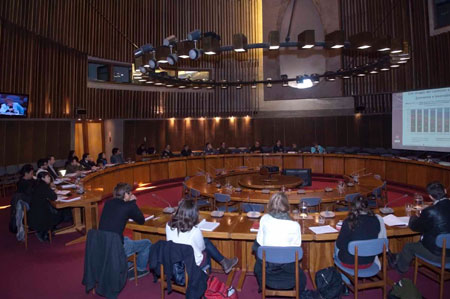2011 Summer School Opened on Latin American Economies
The Executive Secretary of ECLAC, Alicia Bárcena, opened the two-month course attended by 25 students from 14 countries.

(4 July 2011) The 12th Summer school on Latin American economies , organized every year by the Economic Commission for Latin America and the Caribbean (ECLAC), was opened today by the ECLAC Executive Secretary, Alicia Bárcena.
The most senior representative of this regional commission of the United Nations welcomed the 25 students (13 men and 12 women) selected for this training course targeting young researchers interested in analysing and understanding the Latin American development process.
"I hope this course will be a good learning experience for you. I am really interested in our exchanging a research agenda based on reality", stated Ms. Bárcena, who presented the group with the most recent ECLAC document Time for equality: closing gaps, opening trails.
"ECLAC is now engaging in a major reflection on the role of the State, the market and society in Latin America and the Caribbean. We believe it is necessary to build a new social covenant in the region's countries", added the Executive Secretary.
At the opening of the School, which finishes on the 30 August, the students expressed their interest in knowing the theories and proposals of ECLAC, and in thinking about the development of Latin America and the Caribbean.
Students come from the following 14 countries: Argentina, Bolivia (Plurinational State of), Brazil, Colombia, Ecuador, El Salvador, Germany, Italy, Republic of Korea, Mexico, Panama, Spain, United States and Venezuela (Bolivarian Republic of).
Since it was launched in 2000, the programme has trained more than 300 students, thus creating a network of young researchers interested in Latin American and Caribbean development issues from a regional perspective.
In this year's summer school, the young researchers will discuss productive development, structural change, employment and income distribution. Particular attention will also be paid to the link between innovation and development, and the advances in climate change economics.
Any queries should be addressed to the ECLAC Public Information and Web Services Section. E-mail: dpisantiago@cepal.org; telephone: (56 2) 210 2040.
Follow us on: Twitter, Facebook, Flickr and YouTube.